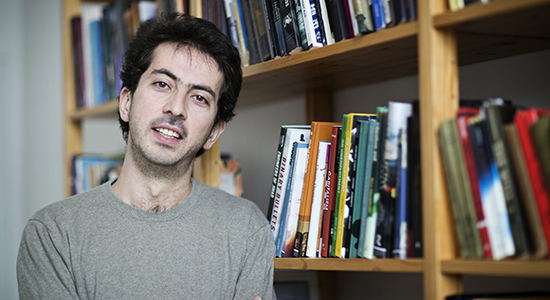BioethicsCPH
We are a diverse group of philosophers doing research and teaching in and around bioethics, medical ethics, and ethics and philosophy of technology at the Department of Public Health, University of Copenhagen.

Current projects look for example at reproductive technologies and family ties, control and delegation in autonomous systems, and medical artificial intelligence. We teach ethics within most degree programs at the Faculty of Health and Medical Sciences here in Copenhagen, including medicine, public health, and health informatics.
Our current research focus is on the future developments of family relationships. Where will this development lead? Where should it lead? Will and should there still be families at the end of this century and if so, what form will and should family ties take? This question is especially crucial given, at the same time, the precious partial bonds that families give rise to but also the inequality that we perpetrate and try to justify through partiality.
Is technological innovation spinning out of control? Within one week in 2018, social media was revealed to have had huge undue influence on the 2016 presidential elections in the United States; while the first fatality from self-driving cars was recorded. What’s paradoxical about these understandable fears of machines taking over control through software, robots and AI, is that often new technology is introduced for the very purpose of improving our control over a certain task. This is what Ezio Di Nucci calls the ‘control paradox’.
Di Nucci also brings this notion to bear on politics: we delegate power and control to political representatives in order to improve democratic governance. However, recent populist uprisings have shown that voters can feel disempowered and neglected by this system. Through the notion of the control paradox, the author shows how this lack of direct control within representative democracies could be motivating populism and argues that a better understanding of delegation is a possible solution.
This is the basic idea behind the book “The Control Paradox: from AI to Populism” which Ezio Di Nucci, the PI of bioethicsCPH, is currently writing.
We are, as a society, increasingly delegating tasks to algorithms and so-called AI (Artificial Intelligence), from healthcare to transportation, from the military to the criminal justice system, from financial services to commerce, from entertainment to social media. The more data these algorithms are fed, the better are they supposed to work, with more recent developments – so called machine learning – pointing to the possibility that some algorithms are able to teach themselves new connections from data without any further input from human programmers. Influential cognitive scientists are claiming that machine learning platforms are able to “figure it out on their own, by making inferences from data”.
Only within healthcare, there are now pathology algorithms tasked with classifying biopsy slides; GoogleBrain algorithms are being used for diagnosing diabetic retinopathy; Watson is being deployed as a decision support system which ranks oncological therapeutic options; and there are many more instances of how algorithms and AI are being used within healthcare. Healthcare, which will be TEMA’s focus, is itself only one of the many domains where algorithms are being deployed, from self-driving cars to social networks. Recently there have also been widely publicized episodes which have raised the question of whether we might be giving too much control to AI systems.
We are responsible for and teach in the following courses at the Faculty of Health and Medical Sciences of the University of Copenhagen:
Medicine Bachelor: Ethics and Philosophy of Medicine
Public Health Master: Advanced Bioethics
Health Informatics Bachelor: Ethics and Philosophy of Technology
bioethicsCPH has a regular weekly research meeting on Wednesdays 13:30-15:30 at CSS, please contact Ezio if you would like to join us.
Partners
- IRLaB - The Interdisciplinary Research Lab for Bioethics, Czech Academy of Sciences
Pandemic Ethics
This project aims at providing an ethical contribution to identifying prioritization criteria for situations of global pandemics, where policymakers face the dilemma that the fulfillment of responsibilities to different groups of people clash, and prioritization is necessary. Another dilemma arises when partly incommensurable values such as respect for health and for democratic freedoms must be weighed against each other because respect for one will put the other in jeopardy.
Pandemic Ethics has received funding from Helsefonden
Background
Indirect prioritizations that do not imply carefully weighing all morally relevant factors are ethically problematic, whether they concern micro-prioritization in the health sector or macro-prioritization at the national or perhaps supranational level. We would argue that this type of indirect prioritization is exactly what is at play, when combatting Covid-19 is prioritized over every other societal interest.
In situations such emergency situations during pandemics, the fulfillment of responsibilities towards different groups of citizens will clash, and trade-offs between them are inevitable. Prioritizations must be made, and we must not forget that this is what politicians do every day; be it by carefully weighing different interests against each other; or be it unintentionally, when solving one problem leads to unintended consequences on others. Prioritizations are made continuously; at the societal level between funds allocated to the health sector versus other government sectors (macro-prioritization). And within the health sector funds are prioritized between medical specialties (micro-prioritization). Sometimes doctors have to prioritize between different patients in cases of overcrowding in hospital wards.
A known problem is that when attempts are made to define overall principles and openly apply these to identifiable human beings, prioritization becomes highly contentious. When Medicinrådet recommends not implementing a certain treatment in the health sector, patient’s groups engage the media and tangible examples of human lives put at risk can make effectuating the recommendation untenable.
The problem is that giving in to the patients who are most visible does not, of course, make the need for prioritization go away. It merely takes it from the visible to the less discernible domains. It perhaps leads to funds being prioritized to patients at risk of immediate death at the cost of patients, e.g. psychiatric patients, who will die from indirect causes relating to a lack of treatment due to downgrading of their medical field. This kind of invisible prioritization is unethical in the sense that it tends to benefit those who are exposed and outspoken at the expense of others with pressing needs who are less visible and whose death might occur at a later point in time.
This project aims at providing an ethical contribution to identifying prioritization criteria for situations of global pandemics, where policymakers face the dilemma that the fulfillment of responsibilities to different groups of people clash and prioritization is necessary.
Publications
Lykkeskov, A. 2022. Pandemic ethics – the case of COVID-19. In: Ezio Di Nucci, Ji-Young Lee, Isaac Wagner (eds), The Rowman & Littlefield Handbook of Bioethics
Lykkeskov, A and E. Di Nucci. 2022. COVID-19 and intergenerational justice: the case of Denmark. In: G. Schweiger (ed.), Philosophical Perspectives on the Social Consequences of the COVID-19 Pandemic. Springer.
Di Nucci, E and A. Lykkeskov. Democracy, Indifference and COVID-19. In: G. Schweiger (ed.), Philosophical Perspectives on the Social Consequences of the COVID-19 Pandemic. Springer.
Lykkeskov, A. 2021 Ben Bramble, Pandemic Ethics - 8 Big Questions of COVID-19, Ethic Theory Moral Prac 24, 423–425. https://doi.org/10.1007/s10677-020-10131-x
Contact
Principal investigator
Email: ezio@sund.ku.dk
Phone: +45 35 33 43 14
Principal investigator
Email: nls778@sund.ku.dk

Principal Investigator (PI)
Ezio Di Nucci
Professor with special responsibilities
Phone: +45 35 33 43 14
E-mail: ezio@sund.ku.dk
Funded by the Velux Foundation 2019-2023
Members
| Name | Title | Phone | |
|---|---|---|---|
| Bidoli, Andrea | Postdoc | +4535326492 | |
| Friis, Jan Kyrre Berg Olsen | Associate Professor | +4535327935 | |
| Guldmann, Finn | Part-time Lecturer | ||
| Jensen, Anja Marie Bornø | Associate Professor | +4535337317 | |
| Knox, Jeanette Bresson Ladegaard | Senior Researcher | +4535337334 | |
| Lee, Ji Yong | Assistant Professor | +4535334245 | |
| Sørensen, Peter Laurs | Part-time Lecturer | ||
| Wagner, Isaac Anderson | Teaching Associate Professor | +4535334788 |
External members
| Lykkeskov, Anne |
| Mertens, Mayli |
Former members
| Name |
|---|
| Andersen, Hanne |
| Bülow, Morten |
| Carusi, Annamaria |
| Christensen, Martin Ejsing |
| Green, Sara |
| Harksen, Henrik |
| Holm, Søren |
| Norup, Michael Slott |
| Schiøler, Elise Utke |
| Silber, Anders |
| Wass, Anne |
| Wulff, Henrik R. |
